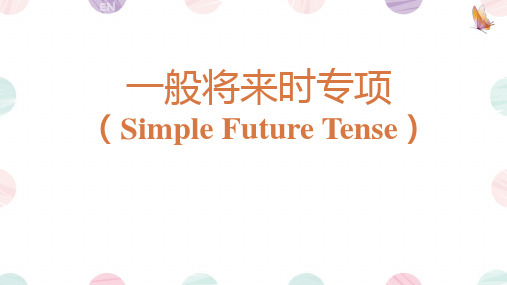一般将来时课件PPT.
合集下载
(完整版)一般将来时课件(PPT)

tomorrow the day after tomorrow tomorrow morning tomorrow afternoon tomorrow evening at 7:00 tomorrow morning ……
2.与“next一家” 连用
next
time year week month term Monday at 7:00 next Sunday morning ……
2.He will find some meat in the fridge soon. (变一般疑问句) W __i_ll he _f_in_d _a_n_y_ meat in the fridge?
3.She will stay there in a week. (对划线部分提问) __H_o_w _s_o_on_ w_i_ll__ she _s_t_a_y_ there?
We will/shall go to Beingjing next week.
He will go to Beingjing next week
(2).变一般疑问句和否定句:
They will have an English party next week. Will they have an English party next week?
2. be going to+do可表示事先计划的意图,而 will 则表示说话人当时决定的意图;
We're going to drive you home after the meeting. Don't call a taxi. We'll drive you home.
I feel ill now, and I'll go to see the doctor. I'm going to see the doctor this evening.
2.与“next一家” 连用
next
time year week month term Monday at 7:00 next Sunday morning ……
2.He will find some meat in the fridge soon. (变一般疑问句) W __i_ll he _f_in_d _a_n_y_ meat in the fridge?
3.She will stay there in a week. (对划线部分提问) __H_o_w _s_o_on_ w_i_ll__ she _s_t_a_y_ there?
We will/shall go to Beingjing next week.
He will go to Beingjing next week
(2).变一般疑问句和否定句:
They will have an English party next week. Will they have an English party next week?
2. be going to+do可表示事先计划的意图,而 will 则表示说话人当时决定的意图;
We're going to drive you home after the meeting. Don't call a taxi. We'll drive you home.
I feel ill now, and I'll go to see the doctor. I'm going to see the doctor this evening.
一般将来时公开课PPT课件

表示计划和打算
01
常见的表示计划和打算的词语
plan, intend, expect等。
02
句子结构
主语 + plan/intend/expect + to do sth.
03
例子
They plan to travel to Europe next year. (他们计划明年去欧洲旅
行。)
表示预测和推断
一般将来时基本概念
定义及作用
定义
一般将来时表示将来某一时刻的动 作或状态,或将来某一段时间内经 常的动作或状态。
作用
用于表示将来的计划、打算、预测、 期望等。
构成形式
will + 动词原形
表示将来的动作或状态,如“I will go to the park tomorrow.”(我明天将去公园)。
现在进行时常用now、at the moment等时间状语, 而一般将来时常用 tomorrow、next week等 时间状语。
与过去将来时的对比
01
含义不同
02
动词形式不同
03
时间状语不同
过去将来时表示从过去某一时间看将要 发生的动作或状态,而一般将来时表示 从现在看将要发生的动作或状态。
过去将来时的动词形式为“would+动 词原形”或“was/were going to+动 词原形”,而一般将来时的动词形式为 “will+动词原形”或“be going to+ 动词原形”。
文学作品中例句欣赏
我预见到了未来,那将是一个充 满希望和美好的时代。—— 《1984》
明天又是新的一天。——《乱世 佳人》
01
“明天,我会想出一个办法把他 弄回来,”她心里想。——《飘》
一般将来时ppt课件

2023/11/29
14
表示邀请或建议
总结词
表示邀请或建议某人做某事,通常用于 口语交流中。
VS
详细描述
在口语交流中,我们经常使用一般将来时 态来表示邀请或建议,例如:“Would you like to come to my house for dinner tomorrow?”(明天你想来我家 吃晚饭吗?)或者“Let's go for a walk after dinner.”(晚饭后我们去散步吧。 )
2023/11/29
23
否定句
结构
主语 + be动词(will not/shall not/can not/may not/must not等) + 动词原形
例句
I will not go to the party.(我不会去参加聚会 。)
2023/11/29
例句
They will not come to our party.(他们不会来参加我们的聚会。)
2023/11/29
16
2023/11/29
04 一般将来时的句型结构
17
主语+助动词will+动词原形
肯定句
I will go to school tomorrow.
否定句
She will not finish her homework.
疑问句
Will they arrive at the airport on time?
“The plane will arrive at 8:00 pm.”(飞机将于晚上8 点到达。)
2023/11/29
11
表示推测或预测
要点一
一般将来时可以用于根据已有的 信息和迹象做出推测或预测,…
一般将来时PPT课件

一般将来时的特殊用法和例句
Be going to结构
介绍be going to结构在一般将来时中的特殊用法。
表计划和打算
举例说明一般将来时推测的语境和例句。
一般将来时常见错误和建议
常见错误 建议
解释常见的一般将来时错误用法。
提供一些建议和技巧,帮助学习者正确运用一般 将来时。
标志词
列举一般将来时常用的标志词和词组。
一般将来时的肯定句
1
主语
介绍一般将来时肯定句的主语使用方法。
2
助动词
解释一般将来时肯定句中的助动词的用法。
3
动词
说明一般将来时肯定句中动词的形式和变化。
一般将来时的否定句和疑问句
否定句
描述一般将来时否定句的构成和特点。
疑问句
阐述一般将来时疑问句的组成和提问方式。
一般将来时PPT课件
本PPT介绍一般将来时的定义、用法、结构、标志词,以及肯定句、否定句、 疑问句的构成方法。同时包括特殊用法、常见错误和建议,最后总结要点。
一般将来时的定义和用法
定义
介绍一般将来时在英语中的含义和用法。
用法
解释一般将来时的常见应用场景和意义。
一般将来时的结构和标志词
句子结构
展示一般将来时的句子结构和基本构成要素。
总结和要点
1 总结
总结一般将来时的核心概念和用法要点。
2 注意事项
提醒学习者注意一般将来时使用中的常见错 误和问题。
一般将来时态讲解(共25张PPT)

• I wonder what will happen. • 我不知道将会发生什么事。
• I don't think the test will be very difficult. 。
②用于“祈使句 + and + 陈述句” 中
I don’t think it will rain this afternoon.
I am hungry. I think I’ll have something to eat.
表示看法,观点
“There be”句型的一般将来时 肯定句: There will be +名词+其他成份 [注意]:无论后面加单数名词或复数形式,be都必须用原形。
shall适用于第一人称I,We;而will适用于所有人称。 通常可以用will来代替shall。 will,shall均可缩写为:'ll,如:
I will= I'll; she will = she’ll;will not 和shall not分别可以 缩写为 won't 和shan't。
1.一般将来时的用法
4. be about to + 动词原形。 表示 (1)“即将做”或“马上做”
(2)因此,句子不能再用时间状语。
Don’t leave. Li Lei is about to come. 不要走了,李蕾就要来了。 Be quiet. The concert is about to start. 安静下来,音乐演唱会就要开始了。
• My uncle will come to see me every Saturday.
• 我叔叔每个星期六都会来看我。
• The students will have five English classes per week this term.
• I don't think the test will be very difficult. 。
②用于“祈使句 + and + 陈述句” 中
I don’t think it will rain this afternoon.
I am hungry. I think I’ll have something to eat.
表示看法,观点
“There be”句型的一般将来时 肯定句: There will be +名词+其他成份 [注意]:无论后面加单数名词或复数形式,be都必须用原形。
shall适用于第一人称I,We;而will适用于所有人称。 通常可以用will来代替shall。 will,shall均可缩写为:'ll,如:
I will= I'll; she will = she’ll;will not 和shall not分别可以 缩写为 won't 和shan't。
1.一般将来时的用法
4. be about to + 动词原形。 表示 (1)“即将做”或“马上做”
(2)因此,句子不能再用时间状语。
Don’t leave. Li Lei is about to come. 不要走了,李蕾就要来了。 Be quiet. The concert is about to start. 安静下来,音乐演唱会就要开始了。
• My uncle will come to see me every Saturday.
• 我叔叔每个星期六都会来看我。
• The students will have five English classes per week this term.
一般将来时PPT课件

A. will go B. won’t go C. can go D. went
一、单项选择
(C) 1. There __________ a meeting tomorrow afternoon.
A. will be going to B. will going to be C. is going to
shall常用于第一人称. shall
否定式:shall not = shan’t
will常用于第二、三人称,但在 will 口语中各种人称都可以用will.
否定式:will not = won’t
四、现_在___进__行___时态 + 表示将来的时 间状语也可以表示将来。
五、There be 句型的一般将来时态 的结构:there +is_g_o_in_g_to_ + be + 名词或there + will+ be + 名词。
begoingto表示根据主观判断将来肯定发生的事情表示根据主观判断将来肯定发生的事情will表示客观上将来势必发生的事情
The Simple Future Tense
一、一般将来时表示将来某一 时刻的动作,状态以及打算。 该时态一般与表示将来意义 的时间状语连用。如:
tomorrow, this month, the day
next week.
A. will be; is
B. is; is C. will be; will be D.
is; will be
(D) 4. There ________ a dolphin show in the zoo
tomorrow evening.
A. was B. is going to have C. will have D. is going
一、单项选择
(C) 1. There __________ a meeting tomorrow afternoon.
A. will be going to B. will going to be C. is going to
shall常用于第一人称. shall
否定式:shall not = shan’t
will常用于第二、三人称,但在 will 口语中各种人称都可以用will.
否定式:will not = won’t
四、现_在___进__行___时态 + 表示将来的时 间状语也可以表示将来。
五、There be 句型的一般将来时态 的结构:there +is_g_o_in_g_to_ + be + 名词或there + will+ be + 名词。
begoingto表示根据主观判断将来肯定发生的事情表示根据主观判断将来肯定发生的事情will表示客观上将来势必发生的事情
The Simple Future Tense
一、一般将来时表示将来某一 时刻的动作,状态以及打算。 该时态一般与表示将来意义 的时间状语连用。如:
tomorrow, this month, the day
next week.
A. will be; is
B. is; is C. will be; will be D.
is; will be
(D) 4. There ________ a dolphin show in the zoo
tomorrow evening.
A. was B. is going to have C. will have D. is going
一般将来时课件PPT

Functional Practise:
1.Students will go to school in the future.(一般疑问句) _W_ill st_ude_nts _go_ to school in the future. 2.There will be some robots in our homes.(改为否定句) There _wo_n`t _be_ a_ny_ robots in our homes. 3.Everyone will have a small car.(对划线部分提问) _Wh_at _wi_ll everyone _hav_e ?
[注意]:无论后面加单数名词或复数形式,be都必须用原
形。
There will be only one country. There is going to be a football match tomorrow.
注意:在口语中,所有人称都可以用will.
be going to+动词原形”和“will+动词 原形” 的区别
❖ 一般疑问句:把be 动词提到句子主语之前,结尾变问号。
❖
Are you going to have a picnic tomorrow?
will 引导的一般将来时:表示将来发生的动作或存在的状态, 最基本的结构:will + 动词原形 肯定句:主语+ will +动词原形+(宾语)+其他
Some day people will go to the moon . 否定句:在will 的后面加not即可。will not 可缩写为 won’t
❖ 3)in+一段时间(回答how soon) ❖ 4)in the future ❖ 5)this Sunday/evening ❖ 6)from now on ❖ 7)one day, someday (未来的)某天 ❖ 8)soon
一般将来时(课件)人教PEP版英语六年级下册(1)

2.sea 5.planets 8.paper
3.space 6.disagree 9.polluted
2.they won't 4.will visit
Thank you ~
3. Will you go to the zoo next Sunday (做出否定回答)
No, I won't.
4. He meets me every morning.(将时间状语every 改为tomorrow)
He will meet me tomorrow.
区别:will/shall+动词原形和be going to +动词原形
3.over and over 3.get bored 4.It to make
5.Will be able to
同步探究Unit 3 Section B
一、AABBC ABCCD
二、1.holiday 4.apartment 7.factories 10.impossible
五、1.Will there 3.won't go 5.What like
7. – Shall I buy a cup of tea for you –________. (不,不要。)
A. No, you won’t B. No, you aren’t. C. No, please don’t
D. No, please.
8. Who ________ we ________ swimming with tomorrow afternoon A. will; go B. do; go C. will; going D. shall; go
(3)如果表示计划去某地,可以直接用be going to +地点. 我们打算去北京度假。
